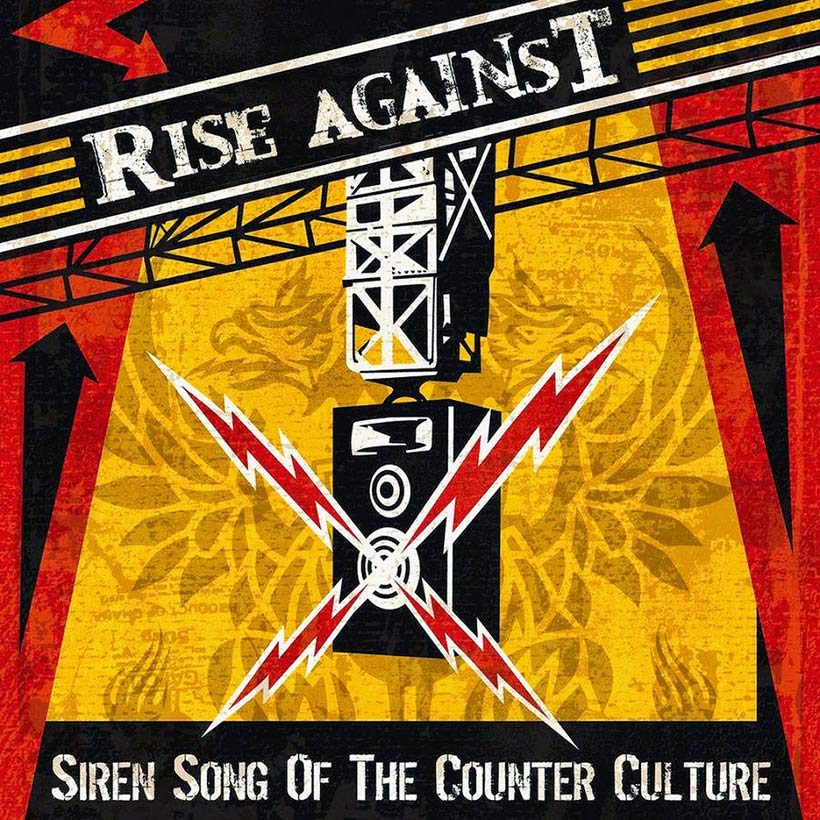‘Siren Song Of The Counter Culture’: How Rise Against Rose To The Top
With ‘Siren Song Of The Counter Culture’, Rise Against created a 21st-century punk classic that “hit a lot of people in a lot of different ways”.

When Chicago punks Rise Against’s spirited third album, Siren Song Of The Counter Culture, rewarded them with their first major chart success in 2004, no one was more surprised than the band themselves.
“Our only goal was just to sell enough records so that when we were home from tour, we wouldn’t have to get jobs,” bassist Joe Principe said at the time. “That was the beauty of [being in a band]. But the longer we did it, more things just kept coming our way.”
Having first formed in 1999, Rise Against were long-established Windy City punk scenesters. Renowned for their songs’ intelligent social commentary, they adhered to punk’s DIY values, initially choosing to remain part of the underground, recording two well-received albums for the US indie label Fat Wreck Chords. Neither their 2001 debut album, The Unraveling, nor 2003’s Revolutions Per Minute, hit the Billboard 200, but they earned impressive reviews, with Rolling Stone proclaiming the latter title to be “easily among the finest punk records of the past decade”.
’Their faith in us was an eye-opener’
With their profile steadily rising, the band also came to the attention of potential major-label suitors. Though initially wary of making the leap, they were impressed by DreamWorks, particularly when Rise Against discovered that the label supported their politically charged lyrics. As frontman Tim McIlwraith admitted, “Their faith in what we do and the fact they cared about stuff we cared about was an eye-opener.”
Accordingly, Rise Against signed with DreamWorks, though during work on Siren Song Of The Counter Culture, their new label merged with Geffen Records, who eventually released the album. Creatively, the band was granted carte blanche, and – in a bid to rid themselves of their pop-punk image – they chose producer Garth Richardson to helm the recording sessions. It was a strategic choice, as Richardson’s engineering and production credits included hard-hitting rock records such as Alice Cooper’s Constrictor and Rage Against The Machine’s incendiary, self-titled debut.
To the credit of both band and producer alike, Siren Song… ended up ticking all the right boxes. A winningly accessible blend of punk, hardcore, and anthemic pop, it found Rise Against decrying social injustice on “The First Drop” and the furious, Anti-Flag-esque “State Of The Union,” but just as convincingly tempering their aggression on melodic tracks dealing with personal issues, such as “Paper Wings” and the smoldering break-up song “Blood To Bleed.” Significantly, the tracklist also made room for the rousing “Give It All” and the unashamedly poppy, acoustic-based “Swing Life Away,” both of which swept into Billboard’s Alternative Songs Top 40.
‘It hit a lot of people in a lot of different ways’
First released on August 10, 2004, Siren Song Of The Counter Culture initially sold modestly, though the band’s relentless tour schedule kept them in the public eye and gave the album the boost it needed. Rise Against were also eternally grateful that Geffen worked hard to promote them at this crucial stage.
“We weren’t calling every day asking them to get us the next U2 tour or whatever,” Tim McIlwraith told Punk News in 2006. “But [Geffen] had seen we were autonomous and we got a lot of respect from them for that. At that point they really helped us out and that was when the record, to all intents and purposes, really started to do well.”
With band and label mutually aligned, Siren Song Of The Counter Culture eventually gate-crashed the Billboard 200 and went gold in the US, moving around half a million copies. The universal appeal of the record’s key track, “Swing Life Away”(which eventually rose to No.12 on Billboard’s Alternative Songs chart), contributed significantly to this mainstream breakthrough, which Rise Against further built upon with the US Top 10 success of “The Sufferer And The Witness.”
“I love ‘Swing Life Away’,” Tim McIlwraith said, reflecting on the song’s chart success in 2006.
“It’s the graduation song, the prom song, the wedding song, and it’s the funeral song too. It definitely hit a lot of different people in a lot of different ways. I’m really glad that a band like Rise Against was able to do a song like that.”












